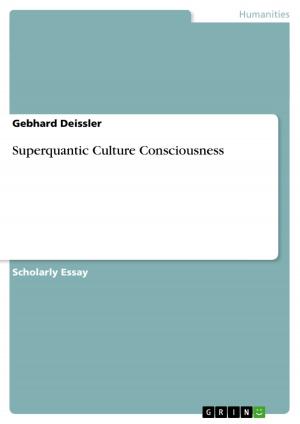Is the idea of a Jewish State anachronistic, based on 19th century ideology, and incompatible with 21st century values?
Nonfiction, Social & Cultural Studies, Political Science, International, International Relations| Author: | Kathrin Nina Wiedl | ISBN: | 9783638470155 |
| Publisher: | GRIN Publishing | Publication: | February 15, 2006 |
| Imprint: | GRIN Publishing | Language: | English |
| Author: | Kathrin Nina Wiedl |
| ISBN: | 9783638470155 |
| Publisher: | GRIN Publishing |
| Publication: | February 15, 2006 |
| Imprint: | GRIN Publishing |
| Language: | English |
Essay from the year 2006 in the subject Politics - International Politics - Region: Near East, Near Orient, grade: 1,7, Ben Gurion University (Middle East Institute), course: Politics and Society of Israel, 32 entries in the bibliography, language: English, abstract: When we look at the contemporary discussions inside and outside Israel, we see a tendency to question the right of Israel to exist as a Jewish State. This criticism comes from two different perspectives. On the one hand it is questioned if a Jewish State - defined by the law of Halakha in important personal matters like marriage and divorce and in several public affairs, such as no public transportations on Shabbat - is contradicting individual rights, such as freedom of religion and women's rights. On the other hand it is questioned if the idea of a Jewish State is compatible with the value of democracy, equal citizen rights for all citizens - including the Arab Israelis - and incompatible with human rights. This essay aims to prove that a Jewish State is an essential part of the world community in order to ensure human rights inside and outside of Israel and justified from the perspective of 21st century values. In order to make this point, we have to examine three things: First: Are the values that led to the Zionist demand of a homeland for the Jewish people still values of the 21st century and is this demand still justified? Second: Does the Idea of a Jewish State contradict the values of the 21st century? Third: Does the reality of all civilians inside the Jewish and democratic State of Israel contradict the values of the 21st century? In this essay we will first define the term 'Jewish State', as it was defined in the early ages of Zionism by Herzl in his book 'Der Judenstaat' (1896) and the Basle Congress in 1897. We refer to Herzl because he is regarded as the founder of modern Jewish nationalism, as expressed in the Zionist idea, and as the father of modern Israel.
Essay from the year 2006 in the subject Politics - International Politics - Region: Near East, Near Orient, grade: 1,7, Ben Gurion University (Middle East Institute), course: Politics and Society of Israel, 32 entries in the bibliography, language: English, abstract: When we look at the contemporary discussions inside and outside Israel, we see a tendency to question the right of Israel to exist as a Jewish State. This criticism comes from two different perspectives. On the one hand it is questioned if a Jewish State - defined by the law of Halakha in important personal matters like marriage and divorce and in several public affairs, such as no public transportations on Shabbat - is contradicting individual rights, such as freedom of religion and women's rights. On the other hand it is questioned if the idea of a Jewish State is compatible with the value of democracy, equal citizen rights for all citizens - including the Arab Israelis - and incompatible with human rights. This essay aims to prove that a Jewish State is an essential part of the world community in order to ensure human rights inside and outside of Israel and justified from the perspective of 21st century values. In order to make this point, we have to examine three things: First: Are the values that led to the Zionist demand of a homeland for the Jewish people still values of the 21st century and is this demand still justified? Second: Does the Idea of a Jewish State contradict the values of the 21st century? Third: Does the reality of all civilians inside the Jewish and democratic State of Israel contradict the values of the 21st century? In this essay we will first define the term 'Jewish State', as it was defined in the early ages of Zionism by Herzl in his book 'Der Judenstaat' (1896) and the Basle Congress in 1897. We refer to Herzl because he is regarded as the founder of modern Jewish nationalism, as expressed in the Zionist idea, and as the father of modern Israel.















